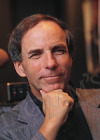HOME | ABOUT US | MEDIA KIT | CONTACT US | INQUIRE
HOME | ABOUT US | MEDIA KIT | CONTACT US | INQUIRE

I was out driving along this January day, thinking of things to write about, when I saw out of the corner of my eye Henry Bloch walking down Main Street.
I had no doubt it was Henry Bloch, the Henry Bloch, the famed entrepreneur and philanthropist. We at Ingram’s had honored him just the previous month. He is 95 years old now and stooped a bit, but there he was walking down Main Street. He had a helper with him, but the helper walked along-
side Henry, who walked unaided save for a cane.
I slowed, hoping to see where Henry was going. As I watched, he passed in front of Yogurtini. I thought he might just be stopping by for some frozen yogurt—this being the first day above freezing in at least a week—but he kept on going, and I lost sight of him. Since he could have easily gotten a ride wherever he chose to go, it seemed altogether possible that Henry was just out for a walk even if the sidewalks were still sloppy with melted snow.
That Henry was walking on a street literally called “Main Street” seemed metaphorically appropriate. His was a Main Street kind of business, the kind that starts small, the kind whose customers are everyday people, the kind that prospers because those everyday people appreciate the service that Henry and his brother Richard—the H&R in H&R Block—provided. Why “Block?” As Henry remembers, “Bloch” often got pronounced “Blotch,” which seemed an altogether unappealing name for a tax service.
I saw Henry on Main Street the day after Amazon announced the 20 cities that made the cut to serve as HQ2, the mega-company’s second headquarters. We cannot say that Kansas City did not try to lure the giant. In fact, one tech blog called Mayor Sly James’s pitch “the most desperate attempt” yet to secure HQ2.
Desperate it was. James and/or his staff bought and reviewed something close to 1,000 items on Amazon, giving each of them five stars as though that might cause Amazon site selectors to overlook all the other variables that went into their decision.
Those still in the hunt, listed alphabetically, are Atlanta, Austin, Boston, Chicago, Columbus, Dallas, Denver, Indianapolis, Los Angeles, Miami, Montgomery County, Maryland, Nashville, Newark, New York City, Northern Virginia, Philadelphia, Pittsburgh, Raleigh, Toronto and Washington, D.C.
To look at a map of the cities chosen is to get some sense of why Kansas City missed the mark. There is a hole in the middle of the country. No city within 400 miles of us made the cut, and only two cities west of us did. Neither of the western cities is likely to be selected.
Although Kansas City is geographically more central than Indianapolis or Nashville, those cities are closer to the population center, and Amazon is all about distribution. Hell, my hometown of Newark, N.J., made the cut, and there is no single attribute of that city we would ever want to duplicate.
As will one day become clear, we were spared. Amazon was threatening to bring 50,000 new jobs to the area. The sheer number would have overwhelmed us, and the new employees would have undone us. Although many of those would have been blue-collar jobs, it was the white-collar ones that worried me.
The West Coast tech companies have almost to a one developed monolithic corporate cultures that not only squeeze the ideological diversity out of their employees, but they also squeeze the ethnic diversity of out of the cities they inhabit. Twitter, for instance, is rapidly turning San Francisco into Berkeley—young, hip, and hostile to everything that is not.
The tech companies demand not only the sweat of their employees, but their souls. In August, for instance, Google senior engineer James Damore expressed his opinions on Google culture in a thoughtful and reasonably cautious memorandum through all the HR-approved communication channels. CEO Sundar Pichai responded to the memo by assuring his employees, “First, let me say that we strongly support the right of Googlers to express themselves.”
He then promptly fired Damore.
In January, Damore and a colleague sued Google. In the lawsuit, the pair shows one example after another—usually through screen shots of since-deleted communications—of the myopia and mean-spiritedness that mask themselves as “Googley” values. When someone expresses an opinion that runs counter to the Google consensus, some snitch or another is quick to “escalate” the issue to management.
As one senior director wrote on an open company post about the Damore memo that started the controversy, “You know there are certain ‘alternative views, including different political views’ which I do not want people to
feel safe to share here. My tolerance ends at my friends’ terror.” This Orwellian thought process was rewarded and encouraged.
There is nothing Main Street about Amazon or Google or Twitter or Facebook or Microsoft. Their executives are not civic leaders of their local burgs. They are citizens of the world. They don’t build community. They build empires. Their philanthropy is aimed less at helping people than at making friends in the right places and holding off anti-trust lawsuits.
Try as hard as I might, I cannot imagine H&R Bloch firing someone because of politics. Nor can I imagine a Bill Gates or a Jeff Bezos or a Mark Zuckerberg making a modest home in the city in which they grew their business, remaining there even through the most brutal of winters, and taking a walk down Main Street when the weather warms up just enough for a 95-year-old to feel secure.
Kansas City has its virtues.
Leave a Reply